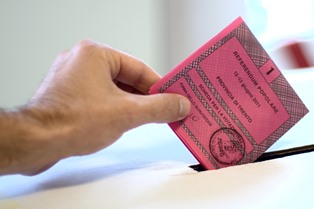
 Umberto Mucci
Umberto Mucci
Italian politics: Changing the rules to change the country
- WTI Magazine #47 Nov 12, 2014
-

 Umberto Mucci
Umberto Mucci
WTI Magazine #47 2014 November, 12
Author : Francesca Papasergi Translation by:
It seems that the latest elections in the US gave Italians the opportunity to think about their Election Law. After some weeks of relative calm, the "Nazareno Deal" strikes back. Last January, the Prime Minister Matteo Renzi and the Forza Italia's leader Silvio Berlusconi found an agreement on some constitutional issues, and among them there is what Renzi calls "the game rules": the Election Law itself, the "Porcellum" set by Mr. Berlusconi's government in 2005.
No decision has been taken yet, but the opposition has already started its fight. So long, and thanks for all the votes, Porcellum.
Italians are supposed to renew both the whole House of Representatives and the Senate every five years. The government doesn't need the popular approval: the prime minister gives a speech to show the chambers its program and eventually gets the Parliament's approval. In regions, provinces and municipalities, people cast their ballot every five years.
Elections are a very expensive affair in Italy. Leaving aside the mere costs of the operations, the parties get money to cover the campaigns' expenses. A referendum had stated that this kind of "public contribution" to political parties had to stop.
However, politicians found a way to transform it in "electoral reimbursement", and drained hundreds of millions of euro. After dozens of scandals and frauds, the current government decided to stop the electoral reimbursement: from 2017 on, the parties will have to count only on private donations.
The Italian and the American systems are quite different from each other and, most of all, in Italy you don't have to register to vote. That fundamental right comes with citizenship, you don't have to ask for it. If there is one reform Italy could inspire US, here it is.